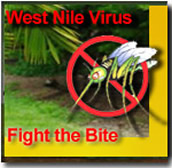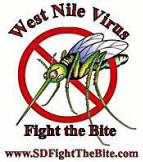|
||
Prevent! Protect and Report West Nile Virus! Now is the time to “Fight the Bite of West Nile Virus!” COUNTY OF SAN DIEGO DEPARTMENT OF ENVIRONMENTAL HEALTH ”Mosquitoes can carry many diseases. The most common mosquito transmitted disease found in San Diego is West Nile Virus (WNV). This virus can result in West Nile fever, or other severe forms of illnesses. Although most people infected by the virus do not show signs of illness, West Nile fever (fever, headache, body aches, occasional skin rash and swollen lymph glands) develops in about 20 percent of the cases. Severe WNV infections, such as This year the San Diego County Vector Control Program has already detected WNV in the county. The wet winter and current warm weather provides mosquitoes with the perfect conditions to breed. Females can lay their eggs in as little as a ½ inch of water. It only takes the eggs about one week to turn into flying, biting adults.Last year proved to be the worst year yet for West Nile Virus in San Diego County.381 Californians contracted the disease, and 18 of them died. San Diego County had 13 locally acquired cases, 12 of the 13 infected individuals were over the age of 50. WNV is NOT transmitted from person to person. Now is the time to get prepared to Fight the Bite of West Nile virus. As the weather begins to warm up mosquitoes are beginning their annual invasion. Females can lay their eggs in as little as a ½ inch of water. It takes the eggs about one week to turn into flying, biting adults in warm weather. Take a few minutes every week to protect yourself and your family from mosquitoes. • Eliminate stagnant water on your property.Keep swimming pools clean and chlorinated. Avoid going outdoors at dawn and dusk, but if you do, it is important to wear long pants and long-sleeved, light-colored shirts. The light color will help you to see mosquitoes, and the clothing makes it harder for them to bite you. Apply insect repellent containing DEET, Picaridin or oil of lemon eucalyptus to exposed skin. Read the product label before applying, and follow instructions carefully. If you have any questions about repellents, ask your physician. The Vector Control Program is currently collecting and testing crows, ravens, jays, hawks, owls and falcons that have died within the last 24 hours. There is no evidence that a person can be infected with West Nile virus by handling infected birds but always use caution. Always wear gloves, and do not freeze the bird. If you are not sure if the bird has been dead for less than 24 hours look for the following clues: If the bird is not a good test specimen, please put the bird into two plastic bags, tie the bag shut, and throw the bird into the trash. To report dead birds, mosquito breeding sources such as green swimming pools, or to get more information about West Nile Virus please call the Vector Control Program at (888) 551-INFO (4636),or on the Web site: www.sdfightthebite.com |
||
Salud + Health Info is for information and educational purposes only. You should not rely on this information as a substitute for personal medical attention, diagnosis or hands-on treatment. If you are concerned abut your health or that of a child, please consult your family’s physician or health provider immediately and do not try and diagnose yourself.Salud+Health Info is a health & community education bilingual magazine published and distributed free of charge by Information Option Network (ION) Publishing Company. Copyright © 2001-2008 Info Option Network |
||
Bienvenido a la primer revista dedicada al cuidado de la salud
 info
info
The first, the best & the only English & Spanish Magazine in San Diego, California
|
Vector Control Program |
 |
| Esta página en ESPAÑOL |
| • West Nile Virus |
| Protecting Yourself from West Nile Virus |
| No One is Safe from the West Nile Virus |
| Don’t become a mosquito’s next blood meal |
| Prevent! Protect and Report West Nile Virus! |
| Safety When Using DEET |
| • San Diego Up date |
| WNV ACTIVITY IN SAN DIEGO |
| West Nile Victim Joins County's Fight Against Virus |
| • Other Sources |
| CDC Fact Sheet: What You Need To Know |
| U.S. WNV ACTIVITY Includes human disease cases reported to CDC |
| • More on Outdoors Safety |
| Poisoning Plants |
| More about outdoors |
| • Indoors safety |
| Fire Prevention (Red Cross) |
| Food Recalls & Alerts(FDA) |
| Food poisoning |
| Safe Food Handling |
| • Other seasonal info |
| Fireworks injuries |
| Safety Around the Water |
| Sun Safety |

